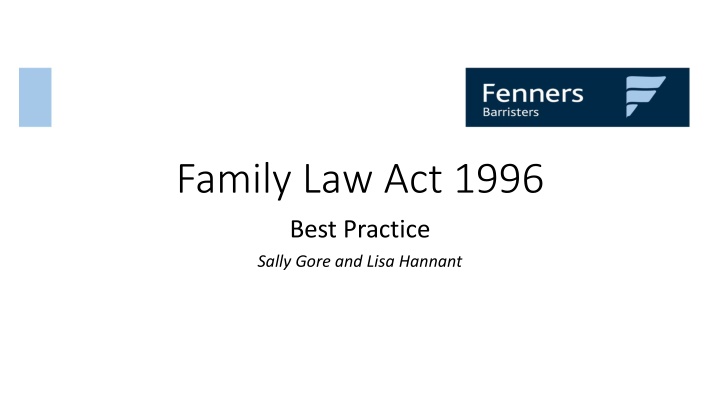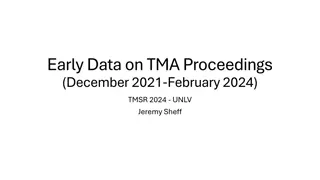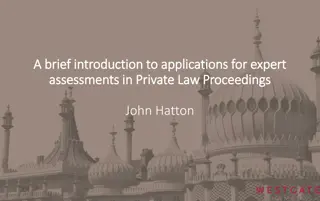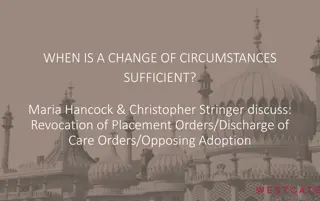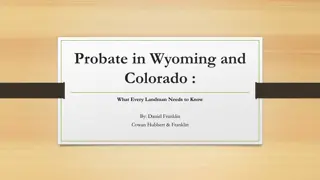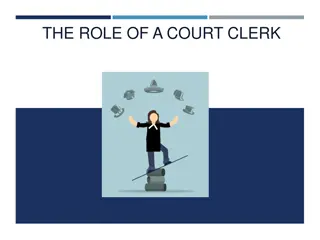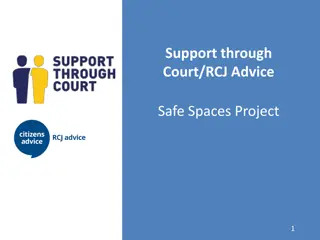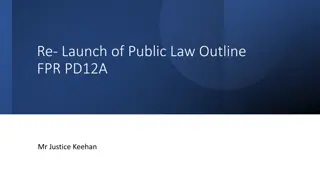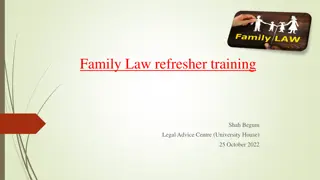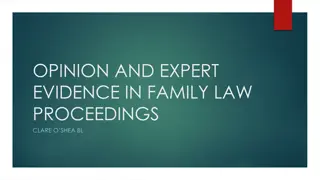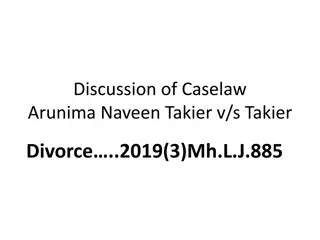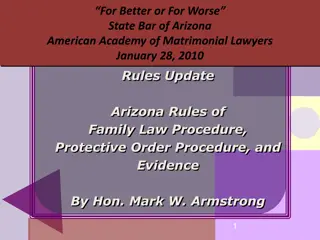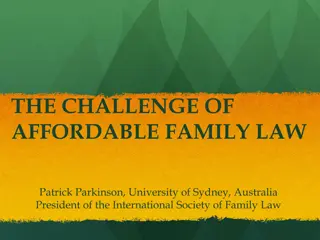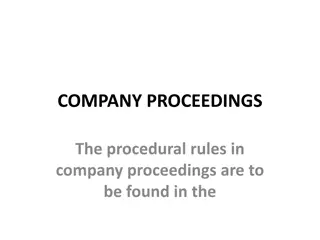Circumstances in Family Law Proceedings
Family Law Act 1996 allows for orders without notice in exceptional circumstances to protect applicants and relevant children. Courts consider risks, deterrence, evasion of service, and prejudice. Proper drafting and caution are emphasized. Injunctive provisions should be justified with specific evidence, ensuring fairness and procedural integrity in family court cases.
Download Presentation

Please find below an Image/Link to download the presentation.
The content on the website is provided AS IS for your information and personal use only. It may not be sold, licensed, or shared on other websites without obtaining consent from the author.If you encounter any issues during the download, it is possible that the publisher has removed the file from their server.
You are allowed to download the files provided on this website for personal or commercial use, subject to the condition that they are used lawfully. All files are the property of their respective owners.
The content on the website is provided AS IS for your information and personal use only. It may not be sold, licensed, or shared on other websites without obtaining consent from the author.
E N D
Presentation Transcript
Family Law Act 1996 Best Practice Sally Gore and Lisa Hannant
Without notice applications exceptional Statute S45 FLA 1996 When just and convenient to do so , the court may make an Occupation Order or Non-Molestation Order even though the Respondent has not been given such notice of the proceedings as would otherwise be required by the rules S45(2) gives a list of the categories.......when determining whether to grant an order without notice, the Court shall have regard to all the circumstances including: (a) Any risk of significant harm to the applicant or relevant child, attributable to the conduct of the respondent, if the order is not made immediately (b) Whether it is likely that the applicant will be deterred or prevented from pursuing the application if an order is not made immediately, and (c) Whether there is reason to believe that the respondent is aware of the proceedings but is deliberately evading service and that the applicant or relevant child will be seriously prejudiced by the delay involved in effecting substituted service.
The exception....not the rule This guidance is repeated in the FL401 application form itself as follows: Applications without the respondent being told ......In exceptional circumstances, such as your safety is immediately threatened, the court may make an order without telling the respondent (the person the order is against). This is called an ex parte or without notice order. It means the court can consider your application without the respondent present. A hearing will be held later and the respondent will be given notice to attend. You can request this in section 1 of this form. You must tell the court why you are applying for a without notice order and what you think might happen if the court does not grant it. And in FPR 2010 Part 18A Para 51: A. An application may be made without service of an application notice only- (a) Where there is exceptional urgency
R v R (Family Court, Procedural fairness(2014) EWFC 48 Mr Justice Peter Jackson This judgment follows a hearing on 18 November 2014 at which I allowed an appeal against a case management order made by a District Judge in proceedings under the Family Law Act 1996. The case highlights important principles, applicable to all such cases: (1) The default position of a judge faced with a without notice application should always be Why? , not Why not? As has been repeatedly stated, without notice orders can only be made in exceptional circumstances and with proper consideration for the rights of the absent party. (2) The court should use its sweeping powers under the Family Law Act 1996 with caution, particularly at a one-sided hearing. Where an order is made, it is the responsibility of the court (and, where applicable, the lawyers) to ensure that it is accurately drafted. This consideration applies with special force when a breach of the order will amount to a criminal offence. (3) Extra injunctive provisions such as exclusion areas and orders prohibiting any direct communication between parties should not be routinely included in non-molestation orders. They are serious infringements of a person s freedom of action and require specific evidence to justify them.
Further Practice Guidance Practice Guidance Family Court Duration of Ex parte orders (without notice) orders of the 18th January 2017 Key point Para 7 I remind all practitioners and judges of the principle, which applies to all ex parte (without notice) injunctive orders made by the Family Court or the Family Division, irrespective of the subject matter of the proceedings or the terms of the order, that a without notice application will normally be appropriate only if: (a) There is an emergency or other great urgency, so that it is impossible to give any notice however short and informal, if or (b) There is a real risk that , if alerted to what is proposed, if tipped off , the Respondent will take steps in advance of the hearing to thwart the court s order or otherwise to defeat the ends of justice. In an appropriate case, this can justify the grant of a NMO without notice, lest the respondent, having been served with an application, further molests his or her victim of exerts pressure on her (him) to abandon the proceedings.
Always remember..... S45(3) If granted without notice the Court must list a return date for the Respondent to make representations as to the Order as soon as just and convenient at a full hearing. Make sure your draft Order (and the finalised Order) includes a return date and specifies the date/time. Without notice order shall never be made without limit of time (18th January 2017 Practice Guidance)
Most recent case....DS v AC (2023) EWFC 46 Mrs Justice Lieven 23. The following principles can be extracted from the FLA and the caselaw: a. On a without notice application the court must consider whether there is a risk of significant harm attributable to the Respondent if the order is not granted immediately, s.45(2)(a); b. And whether the Applicant would be deterred or prevented from making the application if the order is not made immediately; s.45(2)(b); c. A without notice order should only be made in exceptional circumstances and with proper consideration for the rights of the absent party, R v R at [1]; d. The Court should use its powers under the FLA with caution, particularly at a one -sided hearing, or necessarily on a paper consideration without the other party having notice, R v R at [1]; e. molestation does not imply necessarily either violence or threats of violence, but can cover any degree of harassment that calls for the intervention of the court, Horner v Horner at 51G; f. The primary focus of the court should be upon the harassment or alarm and distress caused to those on the receiving end, Re T (A Child); g. There does not have to be a positive intent to molest, Re T at [42].
24.It is important that these principles are applied properly, and orders are not simply granted by default. In particular, it is important for all concerned to note that a without notice application should only be made in exceptional circumstances where there is a risk of significant harm. If a without notice application is made, then the statement in support must expressly deal with why the case is exceptional and what the significant risk alleged is. There can be no doubt that far too many such applications are made where there is no reasonable basis to grant the application without notice. 25. In the present case the District Judge was entirely correct not to grant the order on the without notice application. I appreciate that the Applicant was a litigant in person, and not conversant with the law. However, there was simply no basis for making a without notice order. Such an order is only appropriate where there is significant risk of immediate harm. In circumstances where there had been no contact from the Respondent for at least 3 weeks before the application was made, a without notice order would have been wholly inappropriate on facts such as this.
Service reminders FPR 2010 Rule 10.3 Service of the Application - when on notice 10.3 (1) When on notice, must serve the application and statement in support (and notice of hearing) on the Respondent personally not less than 2 days before the hearing or within such period as the Court may direct. (1A) An application must not be served personally by the applicant himself or herself. (2) When acting in person, can request Court to serve application on respondent (usually it will do so by post) FPR10.6 Service of an Order serve the Order personally on the Respondent, and where made without notice, serve the application and statement too personally. Remember an injunction is not enforceable unless proved that Respondent is aware of it, so personal service is best evidence
